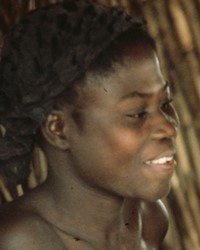Builsa, Buli in Ghana

Photo Source:
Anonymous
|
Send Joshua Project a map of this people group.
|
| People Name: | Builsa, Buli |
| Country: | Ghana |
| 10/40 Window: | No |
| Population: | 231,000 |
| World Population: | 231,000 |
| Primary Language: | Buli (Ghana) |
| Primary Religion: | Ethnic Religions |
| Christian Adherents: | 7.00 % |
| Evangelicals: | 4.00 % |
| Scripture: | Complete Bible |
| Ministry Resources: | Yes |
| Jesus Film: | Yes |
| Audio Recordings: | Yes |
| People Cluster: | Gur |
| Affinity Bloc: | Sub-Saharan Peoples |
| Progress Level: |
|
Introduction / History
The Bulsa live in the north-central part of Ghana in a 2,000 square kilometer area. Most are farmers, with fields located up to five kilometers from the compounds. They raise crops like millet, beans, and groundnuts. Extra income is earned by making crafts, such as pottery, wooden stools, decorative hoe and axe handles, and woven grass baskets and hats.
The Bulsa are a group quite distinct from all their neighbors. They speak a language called Buli and have a proud heritage. When the slave-raider Babatu attacked them in the 19th century, they were able to stand against him and turn him back. That event is celebrated to this day with an elaborate festival just before Christmas.
The traditional Bulsa shelter is a compound of round and rectangular rooms, with courtyards and animal enclosures in between. The rooms are made of a mixture of mud, clay and sand. The roof is either flat, of the same mixture as the walls, or conical made of grass. These rooms last only a few years, and often collapse in heavy rains.
Each compound usually contains men who have a common father or grandfather. There are usually at least three smaller family units in a compound, each made up of about seven to ten people. Some compounds are very large, with over 40 people living there, while others may be very small. Compounds are normally three quarters of a mile apart.
The Bulsa have an open-side grass-roofed shelter outside the compound walls which is used for social activities. It is used as a gathering place for the family as a whole. Certain subsections of the family such as young mothers, children, older women, or men also make use of the shelter throughout the day. This is also the traditional place to receive visitors.
The Roman Catholic Church founded the parish of Wiaga in 1926, and also instituted a clinic which continues to serve the people there. A Presbyterian mission opened in 1957.